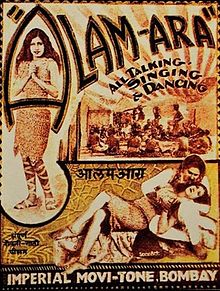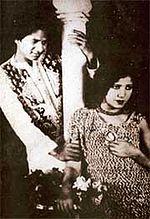Alam Ara: Difference between revisions
No edit summary |
Azimsultan (talk | contribs) mNo edit summary |
||
| Line 13: | Line 13: | ||
runtime = 124 mins | |
runtime = 124 mins | |
||
country = {{flagicon|India}}[[India]]| |
country = {{flagicon|India}}[[India]]| |
||
language = [[ |
language = [[Urdu]] | |
||
budget = | |
budget = | |
||
editing = [[Ezra Mir]]| |
editing = [[Ezra Mir]]| |
||
| Line 19: | Line 19: | ||
}} |
}} |
||
'''''Alam Ara''''' (''The Light of the World''; [[1931 in film|1931]]), directed by [[Ardeshir Irani]], was the [[Firsts in India|first]] [[Cinema of India|Indian]] [[sound film]]. <ref> Goddard, John. "Missouri Masala |
'''''Alam Ara''''' {{lang-ur|عالم آراء}} (''The Light of the World''; [[1931 in film|1931]]), directed by [[Ardeshir Irani]], was the [[Firsts in India|first]] [[Cinema of India|Indian]] [[sound film]]. <ref> Goddard, John. "Missouri Masala |
||
Fear not, St. Louisans: You don't need to go to Bombay to get your Bollywood fix" Riverfront Times, St. Louis, Missouri, July 30, 2003, Music section. </ref> |
Fear not, St. Louisans: You don't need to go to Bombay to get your Bollywood fix" Riverfront Times, St. Louis, Missouri, July 30, 2003, Music section. </ref> |
||
Revision as of 21:00, 15 December 2008
| Alam Ara | |
|---|---|
 Alam Ara film poster, 1931. | |
| Directed by | Ardeshir Irani |
| Written by | Joseph David Urdu: Munshi Zaheer |
| Produced by | Imperial Movietone |
| Starring | Master Vithal Zubeida Jilloo, Sushila, Prithviraj Kapoor |
| Cinematography | Wilford Deming Adi M. Irani |
| Edited by | Ezra Mir |
| Music by | Ferozshah M. Mistri B. Irani |
Release dates | March 14, 1931 |
Running time | 124 mins |
| Country | |
| Language | Urdu |
Alam Ara Template:Lang-ur (The Light of the World; 1931), directed by Ardeshir Irani, was the first Indian sound film. [1]
Irani recognized the importance that sound would have on the cinema, and raced to complete Alam Ara before several other contemporary sound films. Alam Ara debuted at the Majestic Cinema in Mumbai (then Bombay) on March 14, 1931 [2]. The first Indian talkie was so popular that "police aid had to be summoned to control the crowds."[3]
Significance
Both the movie and its music were widely successful[4], including the hit song, De de khuda ke naam per, which was also first song of the Indian cinema, and was sung by actor, Wazir Mohammed Khan, who played a fakir in the film, [4]. As playback singing had yet to start in Indian cinema, it was recorded live with musical accompaniment of a harmonium and a tabla [5].
The film also marked the beginning of filmi music in Cinema of India, as noted film director, Shyam Benegal said, "“It was not just a talkie. It was a talking and singing film with more singing and less talking. It had a number of songs and that actually set the template for the kind of films that were made later,” [6].
Production
Ardeshir Irani handled the sound recording department, using Taran Sound System. It was shot with the Tanar single-system camera, which recorded sound directly onto the film. Since there were no soundproof studios available at the time, the shooting was done mostly in the night, to avoid daytime noises, with microphone hidden near the actors. [4]
Synopsis

The film is love story between a prince and a gypsy girl, based on a Parsi play written by Joseph David. David later served as a writer at Irani's film company. The story centers on an imaginary, historical royal family in the kingdom of Kumarpur. The main characters are the king and his two warring wives Dilbahar and Navbahar. Their rivalry escalates when a fakir predicts that Navbahar will bear the king's heir. Dilbahar, in revenge, attempts to have an affair with the kingdom's chief minister Adil. The affair goes sour and a vengeful Dilbahar imprisons him and exiles his daughter, Alam Ara (Zubeida). In exile, Alam Ara is brought up by Gypsies. Upon returning to the palace at Kumarpur, Alam Ara meets and falls in love with the charming young prince (Master Vithal). In the end, Adil is released, Dilbahar is punished and the lovers marry.

After the fire at National Archives of India, Pune, in 2003, which destroyed last surviving prints of several classics such as, Raja Harishchandra and Achyut Kanya, this film is no longer available in original format [6].
Influences
The film was inspired by Rodgers and Hammerstein's Show Boat by Universal Pictures. [7]
Soundtrack

Film had music by Ferozshah M. Mistri and B. Irani, and had seven songs:
- De de khuda ke naam pe pyaare, taaqat ho gar dene ki, kuch chaahe agar to maang le mujhse himmat ho gar lene ki: Wajir Mohammed Khan
- Badla Dilbayega Ya Rabb tu Sitamgaron se: Zubeida [8]
- Rutha Hai Asman gum ho gaya mahatab: Jillu
- Teri Katili nigahon ne mara
- De dil ko aaram aye saki gulfam
- Bhar bhar ke jam pila ja sagar ke chalane bala
- Daras bina mare hai tarse naina pyare
Cast


- Master Vithal ... Adil
- Zubeida ... Alam Ara, this made her the First Talkie Actress of India [9]
- Jillo
- J. Sushila (as Sushila)
- Prithviraj Kapoor
- Elizer
- Wazir Mohammed Khan
- Jagdish Sethi
- L.V. Prasad
See also
References
- ^ Goddard, John. "Missouri Masala Fear not, St. Louisans: You don't need to go to Bombay to get your Bollywood fix" Riverfront Times, St. Louis, Missouri, July 30, 2003, Music section.
- ^ The 'First' talkies film www.indiamarks.com.
- ^ Quoted in Chatterji (1999), "The History of Sound."
- ^ a b c Talking images, 75 years of cinema The Tribune, March 26, 2006, Retrieved:2008-08-04
- ^ Alam Ara- first song Archives, www.saregama.com.
- ^ a b India's first talkie lost in silence"“It is a sad thing, but there is no print of the film available. We are, however, trying to see if there is anything to be found anywhere else in the world. The search is still on,” says former director of NFAI, K S Shashidharan."
- ^ Goddard, John. "Missouri Masala Fear not, St. Louisans: You don't need to go to Bombay to get your Bollywood fix" Riverfront Times, St. Louis, Missouri, July 30, 2003, Music section.
- ^ Alam Ara Film History.
- ^ First Talkie Actress - Rani Zubieda www.downmelodylane.com.

